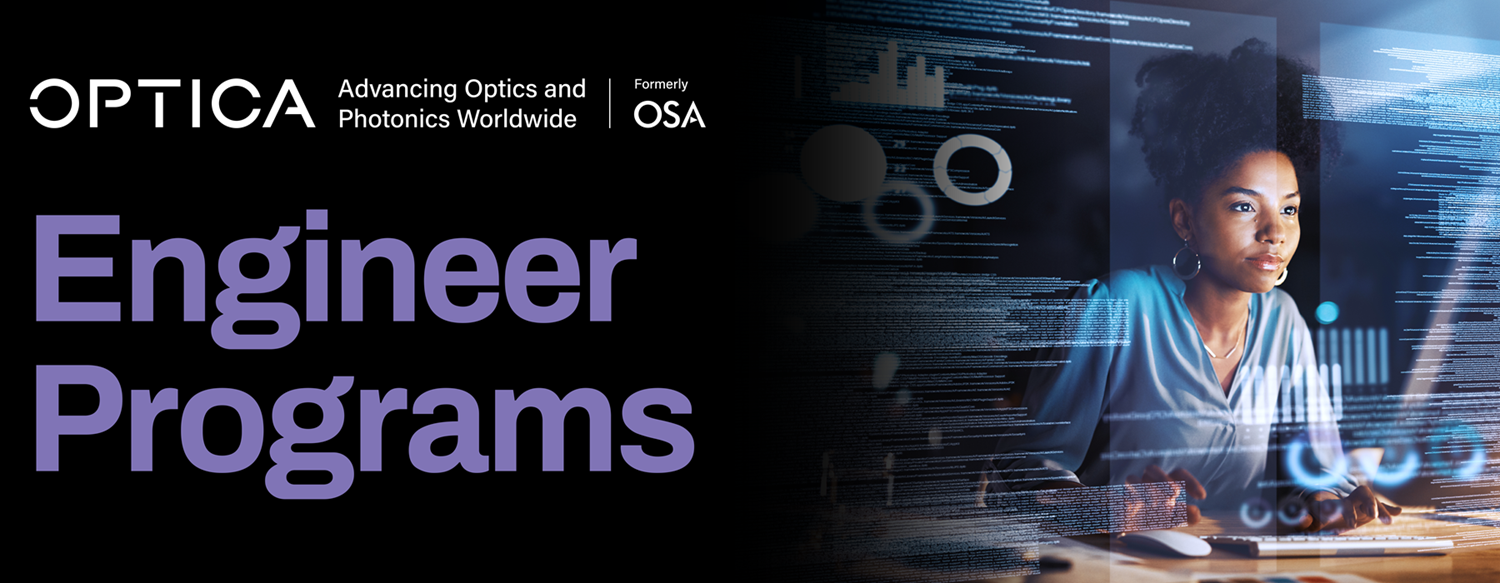Membership

Learn about current trends and
the latest research.
Optica is dedicated to the professional development needs of our members. The Society connects you to a world of engineering research and a wealth of information at your fingertips.
UPCOMING PROGRAMS
Optica Celebrates Engineers Week: From Photonics Innovation to the Marketplace
21-24, February 2023, 14:00 - 17:00
(UTC - 05:00)
This course covers the process of technology development in the photonics industry from the perspectives of both formal processes and case studies. Key aspects of the commercialization process, including intellectual property, new product development processes, technical marketing and team building, are treated in an interactive program informed by the instructor’s 15 years of industry experience in both large corporate research and development organizations and entrepreneurial startups.
Optica Celebrates Engineer Week: Celebration of Engineers — Impacting the Next Generation
23 February 2023, 11:00 - 12:00 - Eastern Time (US & Canada)
(UTC - 05:00)
The speaker, Favour Nerrise of the National Society of Black Engineers, is an electrical engineering doctoral student at Stanford University and an experienced research assistant with a demonstrated history of working in the higher education industry.
Optica Silicon Valley Winter Event
24 February 2023, 15:00 - 18:00 - Pacific Time (US & Canada)
(UTC - 08:00)
The hybrid event will provide detailed insight into how leading companies use photonics to change the future. The event will bring together industry experts, students, job seekers, and early-career professionals for networking, learning, and sharing.
--------------
View On-Demand Programs:
Developing Requirements for Scientific Instrumentation
The benefits of systems engineering are widely promoted with varying degrees of understanding. This webinar is based on many years of experience designing and building complex systems incorporating all of the engineering disciplines (optics, mechanics, electronics, and software). For me, understanding and using systems engineering has been a natural approach driven by my instincts (even before it was a newfound contemporary “thing”). Systems engineering is about balance and perspective. The word “system” conveys the inherently multidisciplinary nature of the work. The engineering work is fundamentally to hold a perspective that makes sure nothing is overlooked that could affect the outcome and to make sure that the best balance is achieved between all of the competing needs and wants that drive the creation of the system in the first place. Systems engineering starts with requirements, and then systems engineering follows on to serve and protect the requirements by constantly evaluating error budgets and the compliance of the system with the requirements as the system is designed and built. In this webinar you will learn by example: - How to approach the development of requirements that satisfies your stakeholders - How to use one sentence definitions to clarify ideas and gain consensus - How to define and manage expectations - How to gain and confirm requirements “completeness”.
Introduction to Mid-Spatial Frequency (MSF) Errors for Optical Surfaces
Mid-spatial frequency (MSF) errors can be a source of small angle scatter or blur in an optical system. This webinar will provide an introduction to MSF errors. It will cover many questions optical designers often ask of optical fabricators, for example: What causes MSF errors on the surface of optics? How can I specify MSF errors so that my surfaces are smooth? How are you going to measure MSF errors?
Laser Systems Engineering
While there are a number of courses on laser design, this course emphasizes a systems‐level overview of the design and engineering of optical systems which incorporate these unique sources of light. Starting with a review of Gaussian beam characteristics and propagation, we then look at laser system optics, beam control and scanning, detectors specific to laser systems, and the integration of these topics for developing a complete laser-based optical system. The emphasis is on real‐world design problems, as well as the commercial off-the‐shelf (COTS) components used to solve them.
